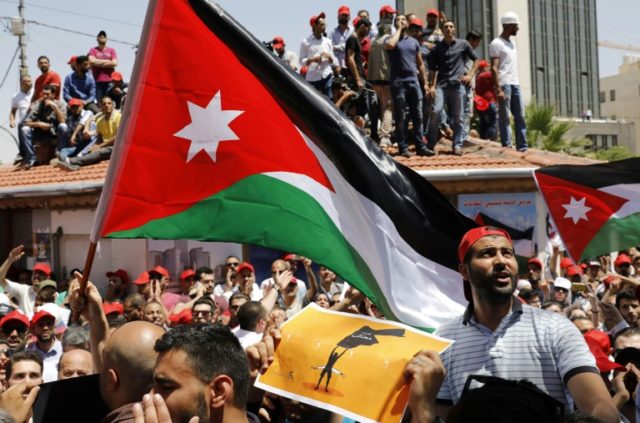Amman (AFP) – Doctors, lawyers and teachers staged a strike across Jordan on Wednesday in protest over IMF-backed austerity measures including a proposed income tax law that have sparked a week of angry demonstrations.
Lawyers in black robes were among more than 1,000 protesters who gathered outside the headquarters of the country’s trade union federation in the capital Amman to demand the government drop the reforms.
Some demonstrators waved Jordanian flags or carried placards reading “I’m afraid for my future” while others held up loaves of flatbread with “corruption = hunger” written on them.
After a week of rallies against reforms backed by the International Monetary Fund, there were few signs that public anger was abating, despite Prime Minister Hani Mulki stepping down and King Abdullah II calling for a full review of the proposed tax law.
If passed, the bill would raise taxes on employees by at least five percent and on companies by between 20 and 40 percent.
A majority of deputies have said they will vote against it, but protesters have staged repeated night-time demonstrations after breaking the Ramadan fast to demand the bill be withdrawn altogether.
Tarek, a 45-year-old lawyer, said the law would imperil “what remains of the middle class”.
“This bill is a disaster,” he said.
Linda, a 35-year-old English teacher at a private school, said it was the first time in her life that she had attended a protest.
Ali al-Abous, head of Jordan’s doctors’ union and trade union federation, told AFP on Wednesday morning that the strike aimed “to send a message to the new government (to) drop the income tax draft law and hold a national dialogue on it.”
– ‘National dialogue’ –
Addressing a crowd later in the day, he said unions had “decided to give the government a chance to hold a national dialogue” on the law, but booing protesters prevented him from finishing his speech.
“That’s unacceptable; we shouldn’t talk to the government until the bill is withdrawn,” said Saad, 27, a pharmacy student, prompting shouts of agreement.
Other protesters accused the unions of selling out their cause.
Abous later clarified on television that the unions’ main demand — to see the bill withdrawn — had not changed but that the government should be given time to respond.
The bill, yet to be approved by parliament, was the latest in a series of austerity measures since Amman secured a $723-million loan from the IMF in 2016.
Since January, resource-poor Jordan, which suffers from high unemployment and poverty, has seen repeated price rises including for staples such as bread, as well as extra taxes on basic goods.
Fuel prices have risen five times since the start of the year, while electricity bills have surged by 55 percent since February.
The measures have sparked some of the biggest economic protests in five years.
Demonstrators gathered in Amman overnight after breaking their Ramadan fast, jostling with police and waving Jordanian flags.
In a letter charging new premier Omar al-Razzaz with forming a government, King Abdullah II said it “must carry out a comprehensive review of the tax system” to avoid “unjust taxes that do not achieve justice and balance between the incomes of the poor and the rich”.
Late Monday, the king had warned Jordan was “at a crossroads”, blaming the economic woes on regional instability, the burden of hosting hundreds of thousands of Syrian refugees and a lack of international support.

COMMENTS
Please let us know if you're having issues with commenting.